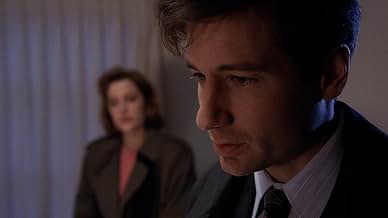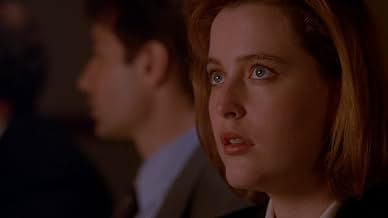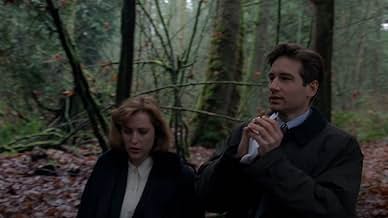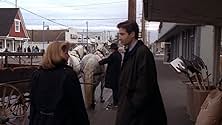Gender Bender
- Episode aired Jan 21, 1994
- TV-14
- 45m
IMDb RATING
7.3/10
6.6K
YOUR RATING
A religious sect becomes the prime suspect in a murder spree.A religious sect becomes the prime suspect in a murder spree.A religious sect becomes the prime suspect in a murder spree.
- Director
- Writers
- Stars
Aundrea MacDonald
- Pretty Woman
- (as Aundrea Macdonald)
- Director
- Writers
- All cast & crew
- Production, box office & more at IMDbPro
Featured reviews
Gender Bender' is much better episode than it gets credit for. Little different than regular X-File and the twist ending might seem far-fetched at first, but the build up is good and the episode has nice ominous atmosphere. Wonderfully haunting score helps to improve the atmospheric feel.
This episode also marks first appearance of Nicholas Lea, but not yet as agent Alex Krycek but as Michael, the victim of the gender bendering Marty.
This episode also marks first appearance of Nicholas Lea, but not yet as agent Alex Krycek but as Michael, the victim of the gender bendering Marty.
Gender Bender sexes things up a bit for the x-files. This episode has an interesting premise, a good story, but an ending that is wanting. Gender Bender is also the x-files debut for actor Nicholas Lea, better known as Alex Krycek. In this episode he plays Michael, a man attacked by one of "The Kindred". You need to see this episode just to see Nic Lea's less than spectacular beginning. An interesting thing about the Kindred's "power of seduction". When Marty does it to his victims, they become turned onto him/her. However, when Andrew seduces Scully, she only because disoriented and groggy, and does not become attracted to Andrew. Maybe it's because Marty has more experience at it than Andrew. This episode reminds me of why it would sometimes be miserable to film up in British Columbia. Throughout the episode it is so wet, soggy, and muddy, it could not have been that much fun. Despite the disappointing ending, Gender Bender is still a decent episode to view.
This is a really interesting episode, I really loved the gender bender plot. Amish people were a really nice touch as well. This is the first episode I ever watched and it got me hooked to the show. It's definitely my favorite from season one.
This episode from the first season slightly edges towards controversy with the whole gender bending angle.I imagine there would have been a significant amount of editing before this was finished to appease censors.
The story itself is original and well written and the directing is complemented by the fine acting.(Nicholas Lea makes his X-Files debut though not as Agent Krycek but as a victim called Michael) I especially enjoyed the built up to and the ending itself.
Its different but enjoyable.Ignore any bad reviews you may hear.Watch it for yourself and make judgement then
The story itself is original and well written and the directing is complemented by the fine acting.(Nicholas Lea makes his X-Files debut though not as Agent Krycek but as a victim called Michael) I especially enjoyed the built up to and the ending itself.
Its different but enjoyable.Ignore any bad reviews you may hear.Watch it for yourself and make judgement then
10XweAponX
This is a freakish episode, I wish it had been revisited because it kind of fit into the mythos of the show. Who were these people? How are they able to move quickly, in the shadows? What were their secrets?
The interesting thing about this is that it shows ordinary looking people being able to cause a severe sexual reaction with the men or women that they interact with. In every case, the person that they target initially tries to tell them to get lost, but the power of attraction is so intense that they just drop whatever they're doing (and whatever they are wearing) and go with it. On the surface they are not even that attractive, especially the "woman". Neither of them, man or woman, were really anything to write home about, in terms of what people deem "attractive".
But these ordinary looking people were able to attract, first, Nicholas Lea (who would later become Alex Krycek), and then later Brent Hinkley (from Silence of the lambs) was able to get a reaction out of Skully.
In fact there was a whole town filled with Brent Hinkleys and Kate Twas (The actress who played the "woman"). Ordinary looking people who live in an Amish kind of community, who, as simple as they appear to be, are not what they appear.
Their abilities give rise to all kinds of questions: especially, how do they vanish? This is also the first time that we see the phenomenon known as a crop circle in the X-Files, but what does it represent here? And then there is also the relationship to a certain kind of mud, which appears to be part of this cult's religious practice.
For comparison's sake, in season nine we get to meet a bug woman and her bug child, who are able not only to control bugs but to spin webs- but they are at least partially explained. In my mind these cult people are even weirder than the bug family. Especially since no attempt was ever made to explain who they were, where they came from, where they went to. But this episode grabs your interest because those are questions that we want answered. They should have been answered. It drives us bugsputz because it was never resolved, not really.
I think part of the point of this episode was to show that even with communities of people that repress themselves in order to stay away from things like bars and sex and booze and Playboy magazines, and collect themselves into communities where there is no electricity or cars, as far away from the temptations of the world you would think that living like that would bring you, those temptations are still there and given an opportunity will sprout into activity. No matter how much they protest to Mulder and Skully that they want nothing to do with the world, they still can't deny that one of their members definitely wanted something to do with the world- and left the community in order to explore that world.
The only solution this cult could think of was to move even further away from the world in general. That's where the speculation comes in, because where they went to, was it out of this world completely? We don't know, because this episode basically dead ends, leaving Mulder and Skully again with nothing to show for it, except for possibly a few flakes of skin from their scalps as they scratched their heads in bewilderment (and not just Mulder and Skully, us as well).
Which was another reason why I loved season one...
The interesting thing about this is that it shows ordinary looking people being able to cause a severe sexual reaction with the men or women that they interact with. In every case, the person that they target initially tries to tell them to get lost, but the power of attraction is so intense that they just drop whatever they're doing (and whatever they are wearing) and go with it. On the surface they are not even that attractive, especially the "woman". Neither of them, man or woman, were really anything to write home about, in terms of what people deem "attractive".
But these ordinary looking people were able to attract, first, Nicholas Lea (who would later become Alex Krycek), and then later Brent Hinkley (from Silence of the lambs) was able to get a reaction out of Skully.
In fact there was a whole town filled with Brent Hinkleys and Kate Twas (The actress who played the "woman"). Ordinary looking people who live in an Amish kind of community, who, as simple as they appear to be, are not what they appear.
Their abilities give rise to all kinds of questions: especially, how do they vanish? This is also the first time that we see the phenomenon known as a crop circle in the X-Files, but what does it represent here? And then there is also the relationship to a certain kind of mud, which appears to be part of this cult's religious practice.
For comparison's sake, in season nine we get to meet a bug woman and her bug child, who are able not only to control bugs but to spin webs- but they are at least partially explained. In my mind these cult people are even weirder than the bug family. Especially since no attempt was ever made to explain who they were, where they came from, where they went to. But this episode grabs your interest because those are questions that we want answered. They should have been answered. It drives us bugsputz because it was never resolved, not really.
I think part of the point of this episode was to show that even with communities of people that repress themselves in order to stay away from things like bars and sex and booze and Playboy magazines, and collect themselves into communities where there is no electricity or cars, as far away from the temptations of the world you would think that living like that would bring you, those temptations are still there and given an opportunity will sprout into activity. No matter how much they protest to Mulder and Skully that they want nothing to do with the world, they still can't deny that one of their members definitely wanted something to do with the world- and left the community in order to explore that world.
The only solution this cult could think of was to move even further away from the world in general. That's where the speculation comes in, because where they went to, was it out of this world completely? We don't know, because this episode basically dead ends, leaving Mulder and Skully again with nothing to show for it, except for possibly a few flakes of skin from their scalps as they scratched their heads in bewilderment (and not just Mulder and Skully, us as well).
Which was another reason why I loved season one...
Did you know
- TriviaThe first X-Files appearance of Nicholas Lea before taking on the role of Alex Krycek.
- GoofsMale Marty is seen in the left hand corner after female Marty exits the car for the officer.
- ConnectionsReferenced in Gone Home (2013)
Details
- Release date
- Country of origin
- Official sites
- Language
- Filming locations
- Production companies
- See more company credits at IMDbPro
Contribute to this page
Suggest an edit or add missing content






















